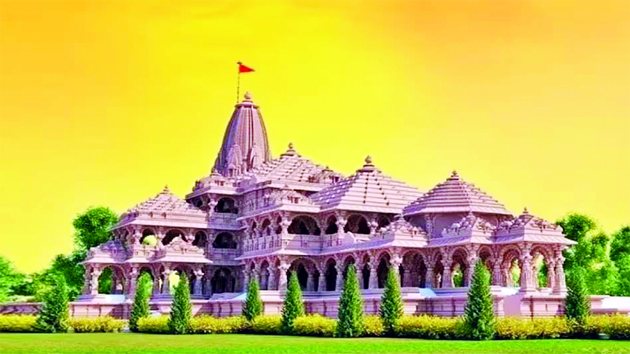Dr Puyesh Kant Sharma
For the reason that finish of First World Struggle, the world is witnessing the development of surge in nationalism and consolidation of nation-state the place cultural id usually competes with constitutional id. Actions for id politics grew to become extra important in varied elements of globe in twentieth century. It was in Germany through the regime of Hitler in Nineteen Thirties, Buddhist motion in Tibet in Fifties, secular Iran was theological state in 1979, reestablishment of Greek Orthodox Church in Russia in post-Chilly Struggle Period, Islamic surge in Turkey and Pakistan and presence of theological nations in varied West Asian states. This was the worldwide problem for India through the decision of Ram temple and Babri Mosque dispute within the Courtroom of legislation since 1949. The query was the way to stability the authorized consciousness with social consciousness which often lack consensus and are in confrontation to one another.
Ram temple in Ayodhya represents civilizational heritage which has noticed an try to destroy it in 1529 by Mir Baqi, Commander of Babur. It was revealed after the excavation survey by Archeological survey of India which urged presence of Hindu construction beneath. The authorized battle for the restoration of Ram temple in Ayodhya began in 1885 when Mahant Raghubir Das filed the go well with twice within the matter looking for permission to construct temple on land adjoining the Babri Mosque however was denied. Nevertheless, it was in December 1949, Authorities of India declared the positioning of Babri Mosque as ‘contested space’. Since then battle was fought within the courtroom of legislation for nearly seventy years until 5 judges Constitutional bench of Supreme Courtroom of India ordered the Authorities of India to create a belief to assemble Ram temple in Ayodhya and allotted 5 acrs of land to Uttar Pradesh Sunni Central Waqf Board for the development of Mosque.
Upholding the sanctity of this civilizational heritage is in consonance with Indian perspective of secularism. On this, state makes a optimistic intervention in non secular affairs to make sure social welfare, public order and the safety of elementary rights. It’s influenced by its non secular range, pluralistic traditions and efforts to deal with historic non secular tensions. As well as, it seeks to deal with historic and social injustices and stop discrimination based mostly on faith. The judgement of the Supreme Courtroom of India has taken due consideration of secular credentials of the structure. It went by all authorized pursuits of justice be it the District Courtroom, Excessive Courtroom, Supreme Courtroom and eventually within the Supreme courtroom it moved from three judges constitutional bench to 5 judges bench. The ultimate judgement was welcomed and accepted by each the Hindus and Muslim teams.
The decision of Ram temple and Babri Mosque dispute within the Courtroom of legislation and building of Ram temple and Mosque depicts the stability of cultural nationalism vis-a-viz constitutional nationalism in India which pulls its justification from civilizational heritage. This nationalism performs a major position in shaping the collective id of India as a nation. A various nation like India and within the midst of phenomenon like globalization, this cultural nationalism acknowledges the significance of cultural assimilation or heterogenization of Indian state-nation.
As state-nation, Indian state encompasses and acknowledges totally different primordial identities, a number of nations a number of distinct cultural, linguistic and ethnic teams coexisting inside India. India is a state-nation in distinction to nation-state is a course of to stabilize cultural nationalism by constitutional nationalism. The decision of the Honorable Supreme Courtroom of India has balanced the cultural nationalism with constitutional mechanism. This outstanding verdict has only a few parallels in historical past all through the globe the place the dispute which was lingered for a lot of centuries was resolved amicably and with none bloodshed. It occurred due to the adherence of secular, multi-cultural, democratic and liberal values rooted within the historic foundations of India.
(The writer is Assistant Professor in Political Science GDC Ramnagar)
#Ram #Temple #Civilizational #Heritage


